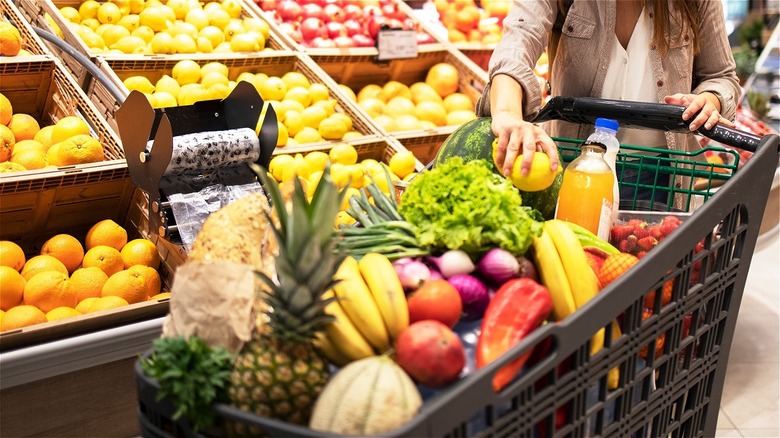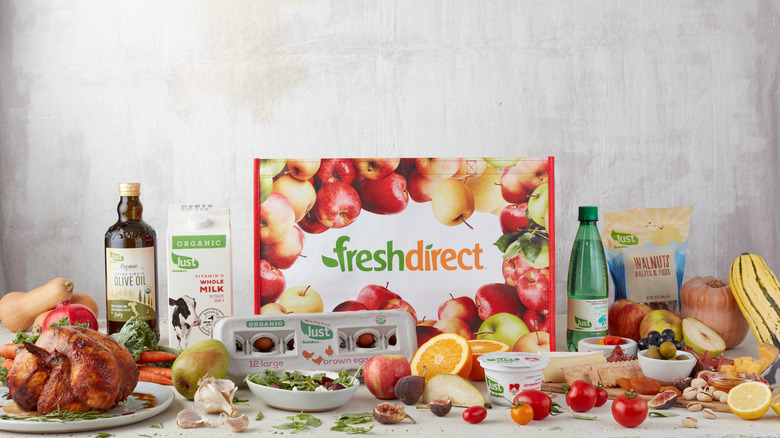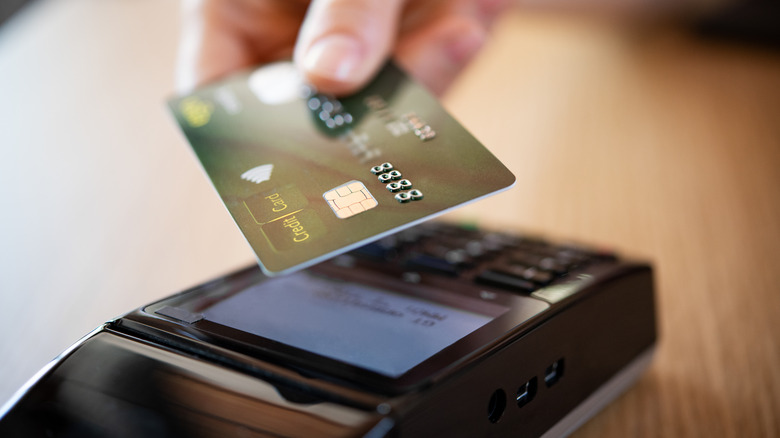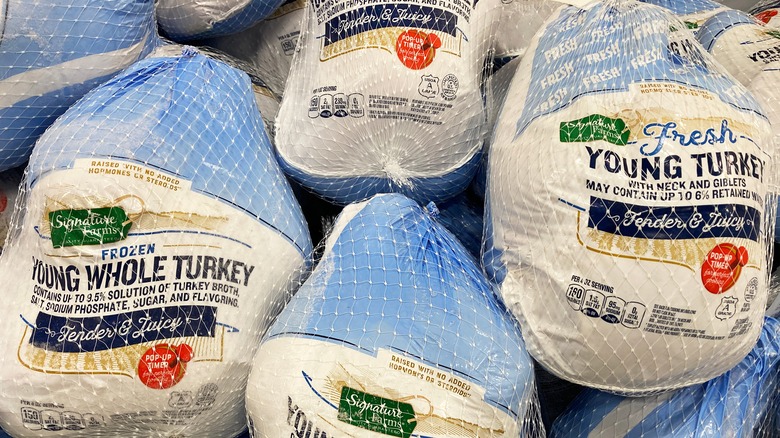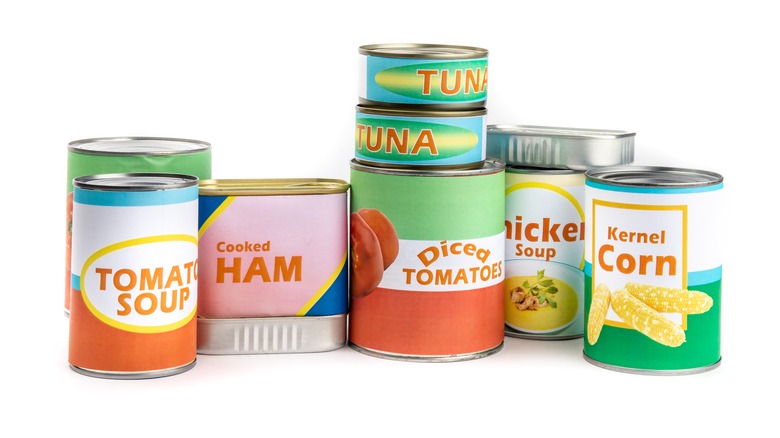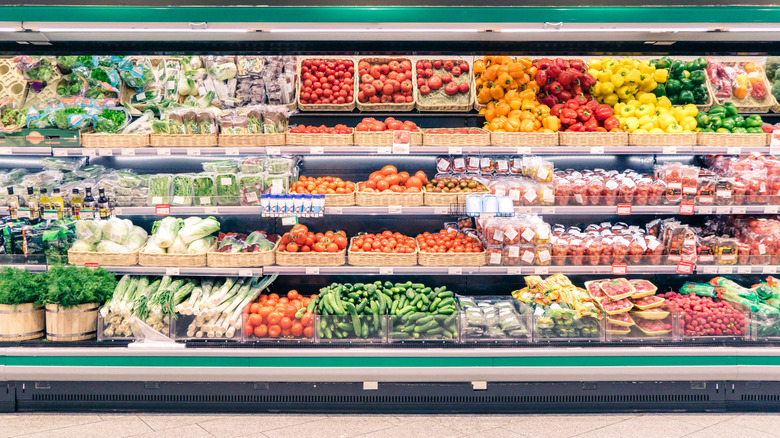How To Save Money At The Grocery Store, According To An Expert
Just when you thought inflation couldn't get any higher, the U.S. Bureau of Labor Statistics announced on March 10, 2022 that the Consumer Price Index (the average price of a standard assortment of consumer goods) had risen nearly 1% in February. This was after the CPI had already risen more than half a percent in January and a whopping near-8% over the course of 2021. Although a sudden and precipitous increase in gasoline prices may be drawing the most attention at this very moment, accounting for one-third of the total monthly price increase, the price of groceries is also rising. That's happening more steadily over time, making it like the "hare" to gasoline's "tortoise." And thanks to the old Aesop fable, we all know better than to underestimate the tortoise.
Indeed, grocery prices alone rose 1.4% during February, with no category emerging unscathed. This represents the largest monthly increase since April 2020, as the BLS points out. On a year-to-year basis, the news is even more unsettling. Whereas the CPI rose "only" 8% throughout 2021, the cost of eating at home went up by 8.6% for the same time period. According to Supermarket News, consumers are now looking at the biggest year-to-year price increase in more than four decades — leading us to wonder, is grocery shopping becoming ... gulp ... a luxury?
Well, not if shopping expert Trae Bodge has anything to say about it. In a conversation with Mashed, Bodge offered a timeless blueprint for saving money on groceries.
Saving money at the grocery store starts with standing in your power
Even as food prices head through the roof, you, as consumer, can remain firmly grounded, according to shopping expert Trae Bodge. Saving money at the grocery store begins with recognizing that you can and you will, which is not nearly as "woo" as it sounds. In fact, Bodge's approach to saving money on groceries begins with adopting what might be more appropriately described as a "hacker" mentality.
"There are so many ways to save on groceries," Bodge tells Mashed, that if you're not strategizing in advance of hitting the grocery store, you might as well accept the fact that you will be leaving "money on the table." And by "strategizing in advance," we're talking not merely about making a shopping list and sticking to it. There's also the issue of all the temptations your favorite supermarket will surely be presenting you with. For example, that scent of freshly baked bread isn't just a coincidence; it's grocery store marketing strategy (via The Ecologist). So too are those colorful end-of-the-aisle displays known as "end caps" which are designed to MAKE the store money, as opposed to offering savings to the consumer (via dotactiv.com). As a matter of fact, some of Bodge's best hacks for saving money at the supermarket begin long before you ever arrive at the store.
Supermarket prices are more "negotiable" than you think
Just to be clear, no one is advocating that you should be haggling over prices with the produce person or the man behind the butcher counter, neither of whom likely have the authority to negotiate with you. Rather, what Bodge wants consumers to understand is that the prices you see at grocery stores already account for the existence of coupons, discounts, and rebates. There are a LOT of them out there, and if you're not taking advantage of these gifts, you can be pretty sure that someone else will. Bodge is, after all.
"A couple of my favorites are using coupon sites for discounts or cashback offers," Bodge tells Mashed. "For example, CouponCabin.com has offers for $50 off purchases of $99 or more at FreshDirect. And if you need an excuse for exploring the joys of shopping online for bulk groceries, consider that Boxed.com reliably delivers discounts of 15% off or more, according to Bodge. And on top of these regular savings, Boxed offers another 20% off on your first order.
Ultimately, "if you plan your shopping around available offers, you can save quite a bit," Bodge promises. Simply type "DISCOUNTS ON GROCERIES" into your search engine to open a portal into a veritable universe of savings.
Saving money requires comparing prices
As shopping expert Trae Bodge sees it, if you're not comparing prices, then you've got to assume you'll be missing out on some savings. When we talk about comparing prices, we're referring not only to comparing unit prices among various brands available at any given grocery store, but also to comparing prices offered at various grocery stores. "Especially if you're shopping online, you should check to make sure you are getting the lowest price," Bodge advises. Because it's not always obvious, and "you don't want to assume."
For example, there are tons of great deals to be had when shopping for groceries online at Amazon. Even shopping at Whole Foods via Amazon opens up the possibility of savings, Bodge points out. However, this is by no means a given across the board.
That being said, Bodge isn't suggesting that you spend your days comparing, say, Amazon's prices to what you can get in the store at Whole Foods, or what you might spend at Shop-Rite versus Sam's Club. That sort of effort isn't necessary with platforms out there such as CouponFollow, which tracks currently available coupons in real time through a browser extension called Cently. That way, you'll be automatically notified if you're missing out on a better price offered elsewhere online.
Choose your credit card wisely
If you're not shopping with the right credit card, shopping expert Trae Bodge tells Mashed, you're missing out on some of the easiest and most accessible grocery store savings available. Various credit cards offer dollars and/or points just for shopping for groceries at all, but some cards offer significantly more points on grocery store purchases than others. For example, many credit cards offer a tidy 1% cash back on groceries, which is certainly nothing to sneeze at. But if you're willing to do just a bit of internet sleuthing, you might be able to quadruple those savings. That's exactly what Bodge has been doing regularly with her Amex Gold card. Although not everyone may be eligible for the Amex Gold card or willing to pay the membership fee, there are many other cards out there offering extraordinary savings, including these eight identified by NerdWallet.
And that's not even counting the Amazon Prime Rewards Visa card that Bodge tells Mashed may be used for Whole Food purchases in exchange for a hefty 5% back, as well as access to exclusive sales available only to cardholders.
Don't discount the value of store rewards programs
One of the most common financial mistakes that shopping expert Trae Bodge sees people making at the store is not joining the loyalty program at your go-to purveyor of groceries. As Bodge points out, for the most part these programs are free, though one possible exception is rewards programs that are part of a warehouse club membership, which, itself, is not free. But for the most part, the "price" of a grocery store rewards card is simply giving the grocery store in question access to data about your purchasing habits. However, it may be a small price to pay for exclusive grocery store savings.
"In some cases," Bodge points out, "you can accrue points towards free items" that would otherwise cost a bundle. For example, simply by virtue of having a ShopRite card in her wallet, Bodge gets a free turkey every single Thanksgiving. That's a significant saving, and it has the potential to become even more notable, as inflation has been hitting fresh meat, fish, and poultry harder than anything else at the grocery store, save for maybe bacon (via U.S. Bureau of Labor Statistics).
Generic brands are not always best
"There's a stigma to generic foods, which I think people need to get over. And let's be honest, generics look fine these days — we've come a long way from the black and white packaging of the '70s and '80s," shopping expert Trae Bodge tells Mashed. "In general, buying generic can be a good way to save money. Items are usually cheaper, yet are often made in the same factories as brand-name items and have the same ingredient profile," explains Bodge. However, buying non-branded grocery store items is best done strategically, which is to say, in a manner that doesn't leave you feeling like you made an enormous compromise.
Bodge recommends looking for non-branded items that you feel "brand agnostic" about. For example, Bodge personally likes to buy generic non-prescription OTC medications rather than the branded version. When it comes to products you feel more "particular" about, it's okay to stick with your brand, Bodge reassures us. For example, she doesn't typically buy generic coffee, chocolate, or paper products. That being said, you still want to keep your eye out for signs you're spending way too much money on food.
Don't be wasteful just to save some cash
Shopping expert Trae Bodge isn't going to tell you not to shop in bulk. But one of the most important things you'll ever need to know before buying in bulk is that no matter how much money you think you might be saving, it's still a waste of money — and food — to purchase more than you can use. "You can waste money at wholesale clubs when you buy certain perishables in bulk," Bodge tells Mashed. "It's important to ask yourself, will we make it through this huge bin of spinach before it gets soggy? Or am I going to take all of those multivitamins by the expiration date? If the answer is no, skip it and buy a smaller quantity, even if the unit price is a bit higher."
On a similar note, while "buying local, in-season produce" can be a smart and sustainable move, the value (and that illusory planet-saving halo) tends to fade if you're not actually going to use a particular item you've "saved" money on. For perishable items you're not sure about, Bodge points out that frozen is always a reasonable option. And frozen will almost always make the most economic sense when you're talking about produce that isn't in season – especially with gasoline prices being what they are. Those bananas aren't going to drive themselves to the Midwest!
